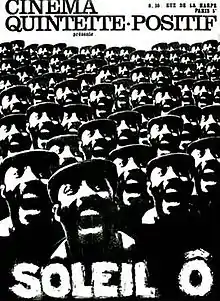Soleil O
Soleil Ô ([sɔ.lɛj o]; "Oh, Sun") is a 1970[3] French-Mauritanian drama film written and directed by Med Hondo.
| Soleil Ô | |
|---|---|
 Film poster | |
| Directed by | Med Hondo |
| Written by | Med Hondo[1] |
| Starring | Robert Liensol Théo Légitimus |
| Music by | George Anderson |
| Cinematography | François Catonné Jean-Claude Rahaga |
| Edited by | Michèle Masnier Clément Menuet |
Production company | Grey Films Shango Films |
| Distributed by | USA: New Yorker Films |
Release date |
|
Running time | 98 minutes |
| Country | Mauritania France |
| Language | French Hassaniya Arabic |
| Budget | $30,000[2] |
Plot
The film Soleil Ô, shot over four years with a very low budget, tells the story of a black immigrant who makes his way to Paris in search of “his Gaul ancestors”. This filmic manifesto denounces discrimination: The immigrants desperately seek work and a place to live, but find themselves face to face with indifference, rejection, and humiliation, before heeding the final call for uprising.
The title refers to a West Indian song that tells of the pain of the black people from Dahomey (now Benin) who were taken to the Caribbean as slaves.
Cast
- Robert Liensol as Visitor
- Théo Légitimus as Afro Girl
- Gabriel Glissand
- Bernard Fresson as Friend
- Yane Barry as White Girl[4]
- Greg Germain
- Armand Meffre
- Med Hondo as the narrator[3]
Reception
The film played during the International Critics' Week at the 1970 Cannes Film Festival where it received critical acclaim.[5] It received a Golden Leopard award at the 1970 Locarno International Film Festival.[6]
In his Family Guide to Movies on Video, Henry Herx wrote that the film's "use of ironic humor and lively music keeps the plight of the black emigrant worker from becoming totally depressing."[7]
In The New Yorker, Richard Brody wrote that "Making friends among France’s white population, [the main character] finds their empathy condescending and oblivious, and his sense of isolation and persecution raises his identity crisis to a frenzied pitch. Hondo offers a stylistic collage to reflect the protagonist’s extremes of experience, from docudrama and musical numbers to slapstick absurdity, from dream sequences and bourgeois melodrama to political analyses."[8]
Restoration
In 2017, Soleil Ô was given a restoration by the Cineteca di Bologna with the supervision of Med Hondo. Funding came from the George Lucas Family Foundation and the World Cinema Project, as part of the latter's restoration initiative called the African Film Heritage Project.[9][10]
See also
References
- "Soleil O > Production credits". AllMovie. Retrieved 26 August 2009.
- Reid, Mark; Blum, Sylvie (31 March 1986). "Med Hondo, interview Working abroad". Jump Cut. Retrieved 24 August 2009.
- Genova, James (2013). Cinema and Development in West Africa. Indiana University Press. p. 120. ISBN 978-0-253-01011-7. Retrieved 29 February 2020.
[Soleil Ô] was copyrighted in 1967, but filming was not completed until 1969; the movie was first screened in 1970 during the international critics' week in Cannes.
- "Soleil O > Cast". AllMovie. Retrieved 26 August 2009.
- "Directors in Focus — African Perspectives: Med Hondo". Harvard Film Archive. 2006. Retrieved 24 August 2009.
- "Winners of the Golden Leopard". Locarno International Film Festival Official Site. Retrieved 26 August 2009.
- Herx, Henry (1988). "Soleil-O". The Family Guide to Movies on Video. The Crossroad Publishing Company. p. 249 (pre-release version). ISBN 0-8245-0816-5.
- "Soleil O Oh Sun". The New Yorker.
- "Soleil Ô". The Film Foundation. Retrieved 29 February 2020.
- Page, Thomas (10 November 2017). "Martin Scorsese leads effort to save lost African cinema". CNN. Turner Broadcasting System. Retrieved 29 February 2020.
The first fruits of the project came to light in May when "Soleil O" ("Oh, Sun," 1970) screened at the Cannes Film Festival under the Cannes Classics sidebar.
- African Film Festival of Cordoba-FCAT (license CC BY-SA)